
George Glenn Jones was an American country musician, singer, and songwriter. He achieved international fame for a long list of hit records, and is well known for his distinctive voice and phrasing. For the last two decades of his life, Jones was frequently referred to as "the greatest living country singer", "The Rolls-Royce of Country Music", and had more than 160 chart singles to his name from 1955 until his death in 2013.
"I'm So Lonesome I Could Cry" is a song written and recorded by American country music singer-songwriter Hank Williams in 1949. The song has been covered by a wide range of musicians.

Kickin' Out the Footlights...Again is a studio album by American country music artists George Jones and Merle Haggard, released in 2006.
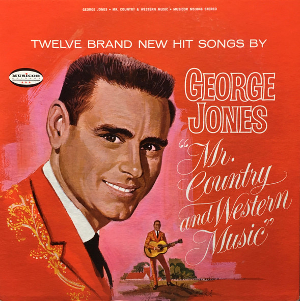
Mr. Country & Western Music is an album by American country music artist George Jones released in 1965 on the Musicor Records label.
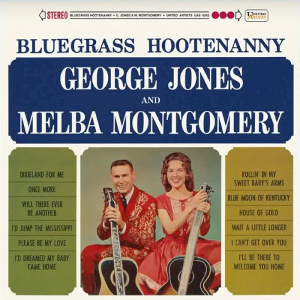
Bluegrass Hootenanny is an album by American country music artists George Jones and Melba Montgomery released in 1964 on the United Artists Records.

George Jones Salutes Hank Williams is the 1960 country music studio album released in May 1960 by George Jones. The album was the ninth studio LP release, and was recorded in one session. The album has been reissued multiple times since its release, including the tracks being reused on many compilations.
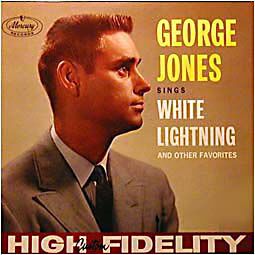
White Lightning and Other Favorites is a studio album released by George Jones on May 26, 1959. Its title track "White Lightning" was a #1 Country hit in 1959.
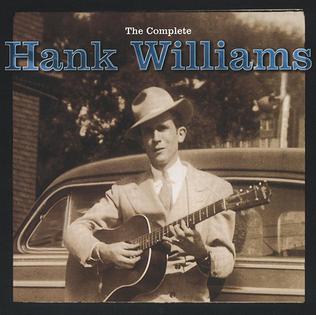
The Complete Hank Williams is a 1998 box set collecting almost all of the recorded works of country music legend Hank Williams, from his first recorded track in 1947 to the last session prior to his untimely death in 1953 at the age of 29. While a number of live and overdubbed songs are excluded, the ten disc collection contains 225 tracks, including studio sessions, live performances and demos. Among those 225 songs are 33 hit singles and 53 previously unreleased tracks.

"Two of a Kind, Workin' on a Full House" is a song co-written by Warren Haynes, Dennis Robbins, and Bobby Boyd. It was originally recorded by Robbins himself in 1987 for MCA Records and charted at number 71 on the Billboard country charts. The B-side to Robbins' version was "The Church on Cumberland Road," which was later a number-one hit in 1989 for Shenandoah.
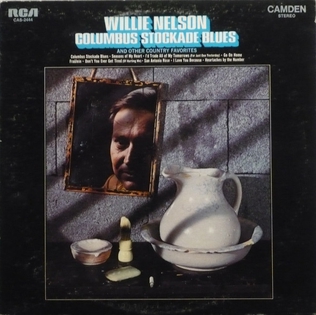
Columbus Stockade Blues is a 1970 album by country singer Willie Nelson. It is an abridged reissue of Nelson's 1966 album, Country Favorites-Willie Nelson Style without the songs "Making Believe", "Home In San Antone", and "My Window Faces The South".

Country Favorites – Willie Nelson Style is the fourth studio album by country singer Willie Nelson. He recorded it with Ernest Tubb's band, the Texas Troubadours and Western Swing fiddler-vocalist Wade Ray with studio musicians Jimmy Wilkerson and Hargus "Pig" Robbins. At the time of the recording, Nelson was a regular on a syndicated TV show hosted by Tubb.

...And Then I Wrote is the debut studio album by country singer Willie Nelson, recorded during August and September 1962 and released through Liberty Records.

Heart to Heart is a duet album by Merle Haggard and Leona Williams with backing by the Strangers, released in June 1983 on Mercury Records. It reached number 44 on the Billboard Country music chart.
"Wedding Bells" is a song written by Claude Boone and recorded by Hank Williams on MGM Records. It peaked at No. 2 on the Best Selling Retail Folk chart in 1949.
"A Mansion on the Hill" is a song written by Hank Williams and Fred Rose and originally recorded by Williams on MGM Records. It peaked at No. 12 on the Most Played Jukebox Folk Records chart in March 1949.
There'll Be No Teardrops Tonight is a song written by Hank Williams and released on MGM Records as the B-side to "Mind Your Own Business" in July 1949.
"I Could Never Be Ashamed of You" is a song written and recorded by Hank Williams. It was released as the B-side of "I'll Never Get Out of This World Alive" on MGM Records in November 1952.
"Take Me" is a song written by George Jones and Leon Payne. Jones originally released the song on the Musicor label in 1966 and scored a No. 8 hit. However, the song is best remembered for being the first single release by Jones and his third wife Tammy Wynette in 1971 on Epic Records. That version was also a top ten hit, peaking at No. 9.
The 42nd People's Choice Awards, honoring the best in popular culture for 2015, were held January 6, 2016, at the Microsoft Theater in Los Angeles, California, and were broadcast live on CBS. The ceremony was hosted by Jane Lynch. Nominations were announced on November 3, 2015.













